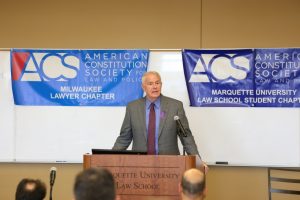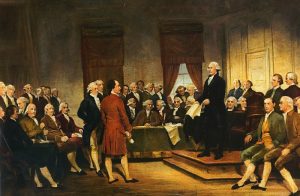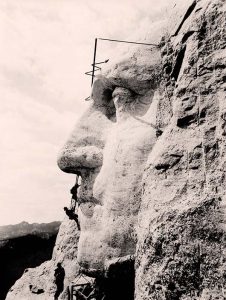ACS Panel Explains Voting Rights Litigation in Wisconsin
 On October 20, I had the honor of moderating a panel discussion at the Law School devoted to Voting Rights Litigation in Wisconsin. The event was co-sponsored by the Marquette University Law School Student Chapter of the American Constitution Society and the Milwaukee Chapter of the American Constitution Society (ACS). A crowd of approximately 60 persons witnessed a lively presentation on the right to vote under the U.S. Constitution, recent legislation in Wisconsin that places burdens on the ability of some people to vote in our State, and the status of litigation in the federal courts challenging these state laws.
On October 20, I had the honor of moderating a panel discussion at the Law School devoted to Voting Rights Litigation in Wisconsin. The event was co-sponsored by the Marquette University Law School Student Chapter of the American Constitution Society and the Milwaukee Chapter of the American Constitution Society (ACS). A crowd of approximately 60 persons witnessed a lively presentation on the right to vote under the U.S. Constitution, recent legislation in Wisconsin that places burdens on the ability of some people to vote in our State, and the status of litigation in the federal courts challenging these state laws.
The event began with a welcome from the Chair of the Milwaukee Chapter of the ACS, Attorney Craig Mastantuono. Attorney Mastantuono began with a description of the mission of the American Constitution Society and the benefits of membership. He also noted the excellent timing of the day’s event, given the attention currently being given to the integrity of the American voting system. Then Attorney Mastantuono introduced the Mayor of Milwaukee, the Honorable Tom Barrett.
Mayor Barrett began his remarks by providing the Marquette University law students in attendance with a bit of career advice: namely, the importance of being nice to your colleagues in the workplace. Turning to topic of the federal judiciary, Mayor Barrett criticized lawmakers who impose litmus tests on judicial appointees, in a misguided attempt to ensure that there is “only one type of thinking in our court system.” Mayor Barrett also expressed his disappointment in the fact that Wisconsin is no longer a national leader in ensuring access to the ballot, and criticized recent state laws that have made it more difficult to vote in the City of Milwaukee. Finally, while he touted the benefits of early voting as a means of improving ballot access, the Mayor explained that there are limits to the City’s ability to expand the early voting process due to the City’s interest in maintaining a well-administered voting process.


